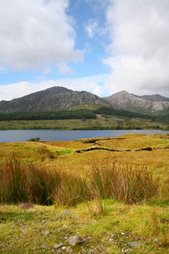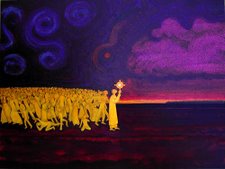
FROM: http://nonviolentjesus.blogspot.com]
Paraguay, one of the poorest countries of Latin America, with a tragic history rarely mentioned in the reports on ex-bishop Fernando Lugo’s assumption of the presidency, was welcomed into the light on August 15 after the longest one-party rule anywhere in the world, 61 years of the repressive Colorado Party. To assess the meaning of this event, both for Paraguay and Latin America as a whole, it is necessary to uncover a tragedy whose long night may at last be lifting. According to Eduardo Galeano, “The woes of the Paraguayans stem from a war of extermination which was the most infamous chapter in South American history, the War of the Triple Alliance, they called it. Brazil, Argentina, and Uruguay joined in committing genocide. They left no stone unturned, nor male inhabitants amid the ruins. Although Britain took no direct part in the ghastly deed, it was in the pockets of British merchants, bankers, and industrialists that the loot ended up.” Eduardo Galeano, “The Open Veins of Latin America”. Before the invasion, Paraguay “was the only Latin American country where begging, hunger, and stealing were unknown” (Galeano). In Paraguay in 1845, every child could read and write. Its economy flourished despite its landlocked confinement, “The economic surplus from agricultural production was not squandered by an oligarchy (which did not exist); nor did it pass into the pockets of middlemen and loan sharks, or swell the profits of the British Empire’s freight and insurance men. ..Ninety eight percent of Paraguayan territory was public property: the state granted holdings to peasants in return for permanently occupying and farming them, without the right to sell them…The lively encouragement of Jesuit traditions undoubtedly contributed to this creative process.” (Galeano). To those who say there is no alternative to savage capitalism, Paraguay before 1865 shines as a beacon of what is possible.
But the dangerous example of building a future “without British bank loans and the blessings of free trade” (Galeano) could not long be endured. President Solano Lopez of Paraguay soon became the Saddam Hussein of his day, “the Attila of America”; “He must be killed like a reptile” thundered the editorials. The war lasted five years. “It was a carnage from the beginning to end of the chain of forts defending the Rio Paraguay. The ‘opprobrious tyrant’ Solano Lopez was a heroic embodiment of the national will to survive; at his side the Paraguayan people, who had known no war for half a century, immolated themselves. Men and women, young and old, fought like lions. Wounded prisoners tore off their bandages so that they would not be forced to fight against their brothers. In 1870 Lopez, at the head of an army of ghosts, old folk and children who had put on false beards to make an impression from a distance, headed into the forest…When the bullets and spears finally finished off the Paraguayan president in the thickets of Cetro Cora, he managed to say: ‘I die with my country’ – and it was true. Paraguay died with him…When the war began, Paraguay had almost as large a population as Argentina. Only 250,000, less than one-sixth, survived in 1870. It was the triumph of civilization.” (Galeano). I have expanded on this episode because only in the full shadow of history can Fernando Lugo’s triumph be understood.
Shod in sandals such as St. Francis might have worn, Fernando Lugo wore the open-necked shirt known as the ao po’i, the garment that the indigenous Guaranis wear. For the first time in many decades, someone in power would notice the poorest in society. Beginning his address in the Guarani language, he gave living testimony that a President would finally speak to the people of the country rather than court their masters in Washington.
Naturally, the corporate media made no mention of Lugo’s enthusiastic support of liberation theology. Nicaragua’s poet-priest Ernesto Cardenal, the former minister of Nicaraguan culture, was in attendance, wearing an open-necked shirt and sporting his characteristic beret. After decades of dictatorship that turned Paraguay into one vast concentration camp, the first frail gestures of defiance against that form of sin known as capitalism were being raised.
There are many approaches to liberation theology, but Gustavo Gutierrez’s treatment, in the opinion of many, has yet to be surpassed. One of the central insights of liberation theology was formulated by St. Paul, "For freedom, Christ has set us free." (Gal. 5:1). What is the nature of this freedom? We are now free to love. "In the language of the Bible," writes Dietrich Bonhoeffer, "freedom is not something man has for himself but something he has for others... It is not a possession, a presence, an object, ... but a relationship between two persons. Being free means 'being free for the other,' because the other has bound me to him. Only in relationship with the other am I free." - Gustavo Gutierrez, "A Theology of Liberation". In other words, human freedom is freedom from all the social structures that reinforce our selfishness, as well as the personal decisions that result in a fixation on self.
The "freedom" which Paul speaks of is the primordial condition for the free development of humanity. Liberation theology sees human development as a field of grace, where we receive God's gifts through participation in liberating action, including growth in the awareness of the economic determinants of our ideological creations and therefore the freedom to reorder those determinants. In this perspective, temporal progress in the sense of greater control over natural processes, accompanied by an ever-deeper insight into how human societies repress their own potentiality for freedom, is seen as the continuation of the work of creation. The central project of Christian economics and politics becomes the overturning of the structures of sin, understood as those social structures which incarnate the spirit of selfishness, which reduce one segment of humanity to objects for another segment, which represent breaches in the solidarity that God wills for humanity, the humanization which is incarnate in Jesus Christ. According to Gutierrez, "...only the concept of the mediation of human self-creation in history can lead us to an accurate and fruitful understanding of the relationship between creation and redemption." - Gustavo Gutierrez, "A Theology of Liberation"
Humanization is the goal of liberation. "The human work, the transformation of nature, continues creation only if it is a human act, that is to say, if it is not alienated by unjust socio-economic structures." - Gustavo Gutierrez, "A Theology of Liberation". Liberating praxis is therefore the humanization of those socio-economic structures so that human beings can assume their own destiny. From this perspective, faith, far from being a hindrance to social liberation, actually sheds a new light on the process of liberation which would not be available without that faith. Progress is not simply a process of greater and greater control over nature through the application of reason, but is guided by an intelligence that pulses at the heart of the world, bending us toward justice in a way that lives beyond our material interests.



9 comments:
this seems like it would be a very interesting blog to keep up with. Please come visit my site Lobby Hobby Directory when you got time.
Awesome! I have read a lot on this topic, but you definitely give it a good vibe. This is a great post. Will be back to read more! Please come visit my site Newark Yellow Page Business Directory when you got time.
I found your blog on google and read a few Thanks for the information you mentioned here, I'm looking forward to see your future posts. Cheers !! Please come visit my site Jersey City Yellow Page Business Directory when you got time.
This is just another reason why I like your website. I like your style of writing you tell your stories without out sending us to 5 other sites to complete the story. Please come visit my site paving when you got time.
I can see that you are an expert at your field! I am launching a website soon, and your information will be very useful for me. Thanks for all your help and wishing you all the success in your business. Please come visit my site Roofing Contractors and give me any valuable feedbacks.
I enjoyed reading your work! GREAT post! I looked around for this… but I found you! Anyway, would you mind if I threw up a backlink from my site? Please come visit my site Ottawa Business Directory when you got time.
As a Newbie, I am always searching online for information that can help me. Thank you. Please come visit my site Prince Edward Island Directory when you got time.
You do have a point here :) I admire the stuff you post and the quality information you offer in your blog! Keep up the good work dude. Please come visit my site Minneapolis Yellow Page Business Directory when you got time.
Me and my friend were arguing about an issue similar to this! Now I know that I was right. lol! Thanks for the information you post. Please come visit my site St. Paul Business Directory when you got time.
Post a Comment